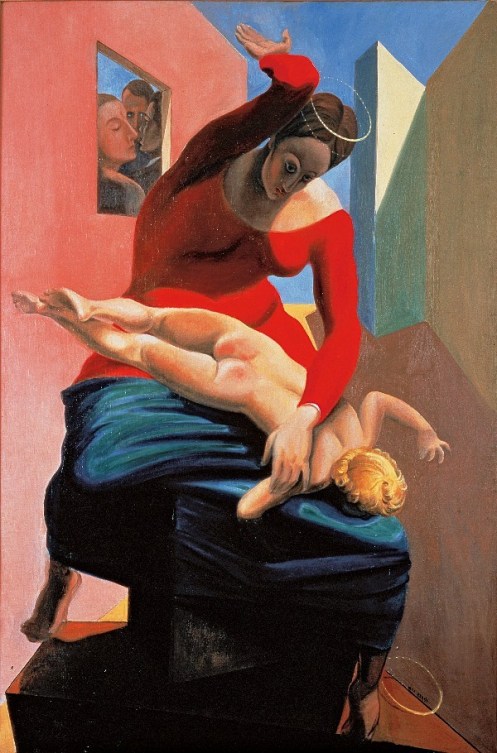It appears that to bear the weight of mum’s judgement means not only a sore bum but also a dropped halo. It appears that the Aryan half-pint might have again stolen her favourite manicure set from the middle drawer of the bathroom cabinet while he was supposed to be tidying his sister’s bedroom. It does not yet appear that in this act of descending freedom, of vacating a head that others might gild mockingly with thorns, the embarrassing shape of kenotic love is taking costly form. And it’s not as if
there is chaste indulgence here; this act of discipline reminiscent of Michelangelo’s Sistine Christ, this act of judgement upon cobalt and rubicund outlining her own contorted arm and deepening her own overtaxed gaze. A foretaste of arms bearing sin-gnarled stock and hers, those eyes which again will grieve as arms not her own are brought to bear upon her bare first-born, this unexpected fruit in whom her future and that of all shall find shape. And an open roof. Did it fly off with upswing arm so that one who sees everything could weep?
It has been some time too since Paul and Vincent came over, and now this other Paul, and André and Max; seemingly unsedated risk now transformed into dispassion. Was Gala really the benchmark of our friendship, our means of communication, our shared wife? What kind of love did we make to each other in her? And what of love once promised now turned, love now come to assault me? A naked face turned away in a sensuous spell.
© Jason Goroncy
24 December 2011

I like your interpretation of the painting.
There’ll be a job going soon at the Art Gallery of NSW – when Edmund Capon retires. It would be an interesting occupation. :)
LikeLike
Hey Jason,
Thanks for this, and for all the art/poetry during Advent.
Do you know Carol Ann Duffy’s
“The Virgi Punishing the Infant”
after the painting by Max Ernst?
He spoke early. Not the goo goo of infancy,
but I am God. Joseph kept away, carving himself
a silent Pinocchio out in the workshed. He said
he was a simple man and hadn’t dreamed of this.
She grew anxious in that second year, would stare
at stars saying Gabriel? Gabriel? Your guess.
The village gossiped in the sun. The child was solitary,
his wide and solemn eyes could fill your head.
After he walked, our normal children crawled. Our
wives
were first resentful, then superior. Mary’s child
would bring her sorrow … better far to have a son
who gurgled nonsense at your breast. Googoo. Googoo.
But I am God. We heard him through the window,
heard the smacks which made us peep. What we saw
was commonplace enough. But afterwards, we
wondered
why the infant did not cry. And why the Mother did.
Merry Christmas to you and yours —
and a New Year of fine blogging.
Kim
LikeLike
Hi Kim. Merry Christmas to you and yours too. And thanks for sharing the poem by Duffy (it was unknown to me) and the quote from Bailey. The latter was the cause of some serious discussion around our house. Continued strength as you bear witness to the lordship of Christ, and to the Father’s holy love.
LikeLike
I wonder – is there any link between this artwork of Max Erenst and wawt is known as “Black Pedagogie” that was a common way of child raising – at the time Max Erenst childhood in Germany?
LikeLike
I think it’s clear that the babe thought, since his halo fell,he was getting what he deserved,thus being the Christ Lord Jesus, he didn’t cry or make any negative reactions. If anything,he seemed happy to be chastised,as though he agreed with Mary he deserved a reddened behinder.
LikeLike